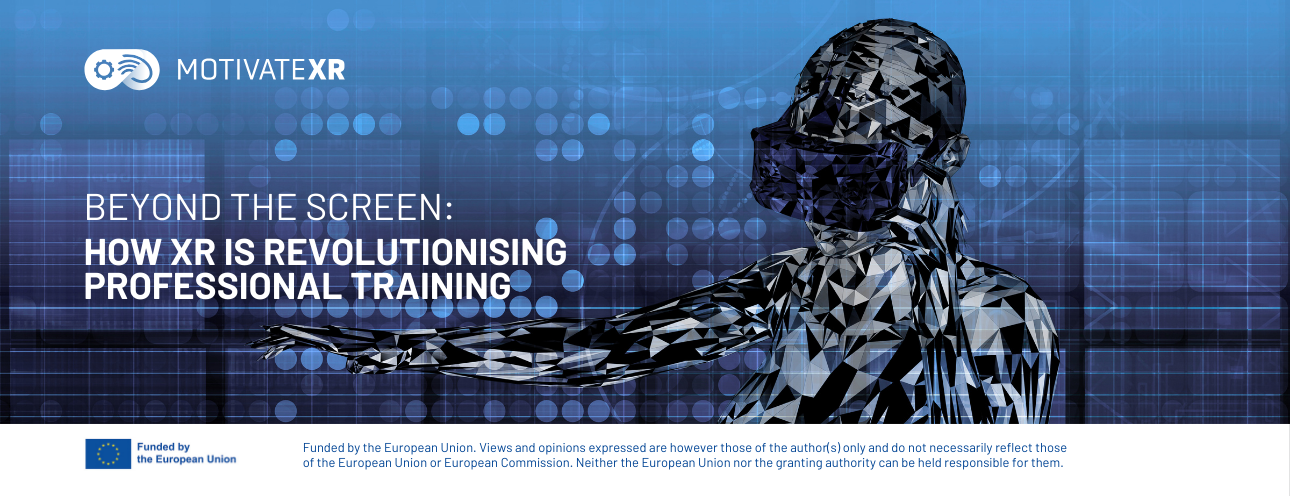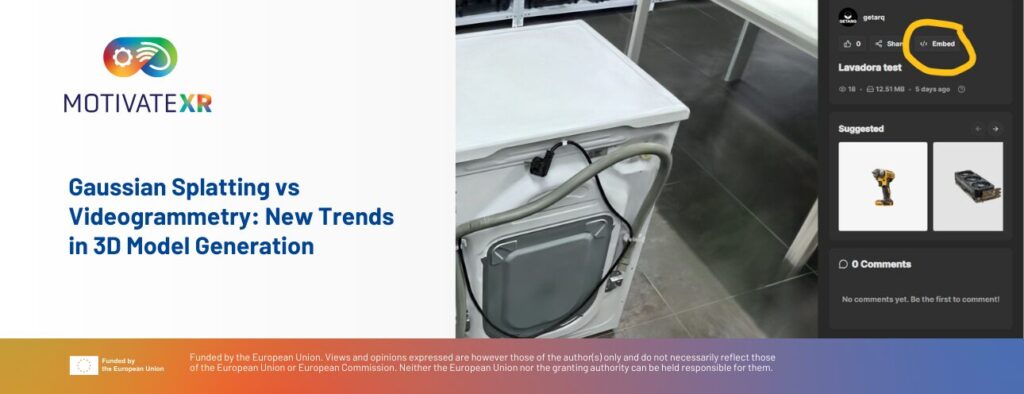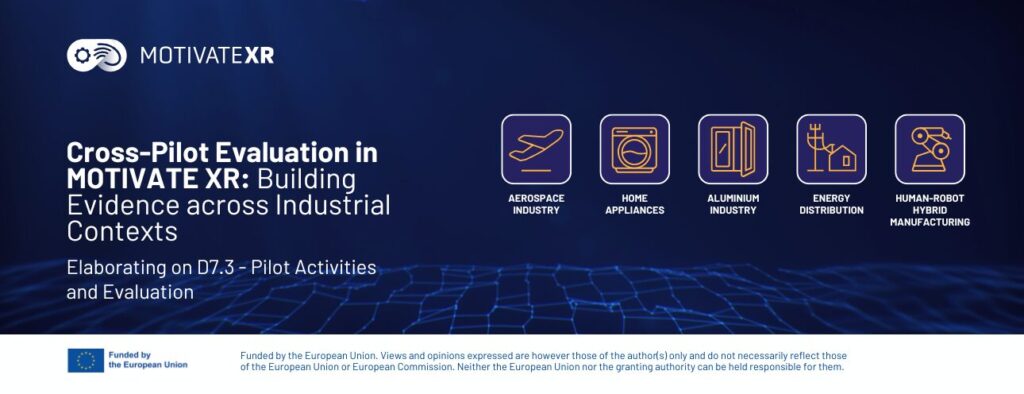The future of professional development is here, and it’s powered by Extended Reality (XR). Across strategic sectors, from advanced manufacturing and healthcare to military and aerospace [1], XR is significantly reshaping how employees acquire and refine skills [2].
This goes beyond a merely upgrade to traditional training methods: it’s a paradigm shift. By creating interactive and immersive environments, XR provides a risk-free space for workers to master complex tasks, leading to profound improvements in safety, knowledge retention, and overall productivity [3]. As companies seek to stay competitive, they are increasingly recognising XR solutions as a strategic investment [4].
This blog post will explore the key benefits of integrating these innovative technologies into employee training programs, highlighting how they are setting a new standard for effective and efficient learning.
Improved Knowledge Retention
XR training simulates complex operational scenarios, allowing employees to try, make mistakes, and learn without negative, real consequences [5]. XR enables the creation of a safe and controlled environment where trainees receive clear instructions and guidance. This significantly contributes to speeding up the learning and operational process. In an interview [6], Dr. Narendra Kini, CEO of Miami Children’s Health System, stated that the retention rate one year after a virtual reality training session can be as high as 80%. This is a significant increase when compared to the 20% retention percentage which is typically observed with traditional training methods. Similar results were reported by PwC’s latest study [7], according to which VR training fosters improved knowledge retention. A complementary study by Thermopylae [8] supports the effectiveness of employing interactive learning tools considering that visual information gets processed at a higher rate compared to written text. Consequently, engaging learning scenarios ensure active and compelling educational experiences for employees.
Increased Workers’ Safety
The widespread use of XR for training has proven to considerably enhance workers’ safety. XR-based training provides an immersive and simulated learning environment that transfers safety knowledge, while boosting trainee engagement, collaboration, and confidence in a stress-free and controlled scenario [9]. Consequently, employees can practice complex tasks without facing real-life risks. This instance can be exemplified through aviation training, where XR simulations are used in place of conventional flight simulators to effectively train future pilots and maintenance engineers, reducing errors and accidents [10].
Cost Efficiency
The financial benefits of upskilling the workforce through the implementation of XR-based training programs are calculated considering the return of investment (ROI) [11]. Three factors are generally taken into account when evaluating the benefits of XR training: 1) retention rate, which can reach up to 80% one year after the learning experience has been completed; 2) engagement rate, as – when compared to more traditional educational approached – XR training registers a higher level of commitment from trainees; 3) freedom to fail, since mistakes made in a virtual environment don’t have real consequences, which contributes to help workers develop their skills in a more confident setting. A study [12] conducted by PwC concluded that for 1,950 learners, VR training achieved cost parity with e-learning, while at 3,000 learners, VR costs were reduced to 52% less than classroom training. Moreover, through VR applications, trainees completed their training four times faster than those in a classroom [13]. This translates into cost and time savings for companies, while guaranteeing a high standard of proficiency.
Enhance Soft Skills
XR is highly effective at enhancing soft skills, such as communication, problem-solving, active listening, and teamwork [14]. Through simulated interactions in virtual environments, employees practice and develop required soft skills, which are essential for customer interaction, negotiations, and conflict resolution [15]. As highlighted by Boland [16], immersive technologies are democratising education and improving learning accessibility. Traditional training approaches often lack the ability to translate theoretical knowledge into real-world application, which is where XR can intervene and ensure greater engagement.
Conclusion
Industries can capitalise on the several benefits offered by innovative XR solutions for training their employees. The convergence of these cumulative benefits, fuelled by the advancements of XR technologies from industry leaders such as Apple, Meta and Sony, facilitates the development of comprehensive and efficient training programs.
XR-integrated training experiences provide engaging, personalised, and highly effective growth opportunities that traditional training methods simply cannot match. By offering such cutting-edge development, organisations signal a strong commitment to their employees’ professional growth and career progression.
The future of workforce development is undeniably set to be more immersive, engaging, and intelligent than ever before, with XR at its strategic core.
References
[1] Doolani, S.; Wessels, C.; Kanal, V.; Sevastopoulos, C.; Jaiswal, A.; Nambiappan, H.; Makedon, F. A Review of Extended Reality (XR) Technologies for Manufacturing Training. Technologies 2020, 8, 77. https://doi.org/10.3390/technologies8040077
[2] https://www.mordorintelligence.com/industry-reports/extended-reality-xr-market
[3] XR GURU (2022). A White Paper on Using (XR) Extended Reality in Workforce Development and Employee Training, https://www.xrguru.com/whitepapers
[4] Doolani, S.; Wessels, C.; Kanal, V.; Sevastopoulos, C.; Jaiswal, A.; Nambiappan, H.; Makedon, F. A Review of Extended Reality (XR) Technologies for Manufacturing Training. Technologies 2020, 8, 77. https://doi.org/10.3390/technologies8040077
[5] https://hqsoftwarelab.com/blog/ar-vr-training-benefits/
[6] https://fortune.com/2015/08/17/virtual-reality-hospitals/
[8] XR GURU (2022). A White Paper on Using (XR) Extended Reality in Workforce Development and Employee Training, https://www.xrguru.com/whitepapers
[9] Dodoo J.E., Al-Samarraie H., AAlzahrani A. I., Tang T. XR and Workers’ safety in High-Risk Industries: A comprehensive Review, Safety Science, 185, 2025, https://doi.org/10.1016/j.ssci.2025.106804
[10] Ross G., Gilbey A., Extended reality (xR) flight simulators as an adjunct to traditional flight training methods: a scoping review, CAES Aeronautical Journal (2023) 14:799-815, https://doi.org/10.1007/s13272-023-00688-5
[11] https://drawandcode.com/learning-zone/what-is-the-roi-on-virtual-reality-training/
[13] https://www.pwc.com/us/en/tech-effect/emerging-tech/virtual-reality-study.html
[14] Boland B., Extended Reality Vocational Training’s Ability to Improve Soft Skills Development and Increase Equity in the Workforce. AI, Computer Science and Robotics Technology 2023(2), 1–15, https://doi.org/10.5772/acrt.22
[15] https://hqsoftwarelab.com/blog/xr-training/
[16] Boland B., Extended Reality Vocational Training’s Ability to Improve Soft Skills Development and Increase Equity in the Workforce. AI, Computer Science and Robotics Technology 2023(2), 1–15, https://doi.org/10.5772/acrt.22
Authors

Gruppo Maggioli
Erica Fabbris is an undergraduate student in the Bachelor’s degree program “Development and International Cooperation” at Alma Mater Studiorum – Università di Bologna. She completed an internship with the R&D Department of Maggioli Group, an Italian company providing digital services and software for Public Administrations. Erica’s main interests include cybersecurity, artificial intelligence and immersive technologies.

Gruppo Maggioli
Sabrina Bianchi works as EU Project Manager in the R&D Department of Maggioli Group, one of Italy’s leading companies providing software and digital services for Public Administrations. After obtaining her Master’s degree in International Relations at the University of Bologna, she specialised in the dissemination, communication, and exploitation of European projects, particularly in the fields of Immersive Technologies, Sustainable Energy and Artificial Intelligence.



